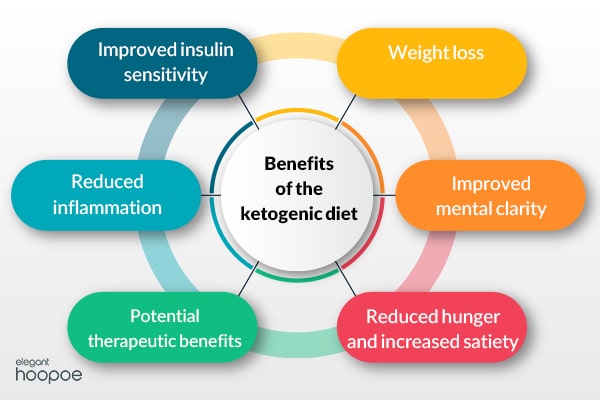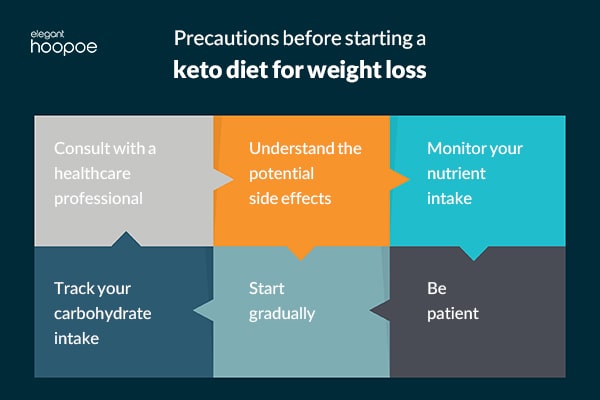The ketogenic diet, or keto diet for short, is one of the best diets for weight loss and a well-known diet plan for rapid weight loss. The diet may not look like a slimming diet at first glance, because it is a low-carb, high-fat weight loss diet! But it has gained popularity in recent years for its potential weight loss effects.
How can you lose weight by eating fat? In the ketogenic diet, the metabolic source of the body changes from carbohydrates to fats (the body uses fat for energy instead of carbohydrates), which is called ketosis. It means you drastically reduce carbohydrate intake and replace it with healthy fats(unsaturated fat) to induce a metabolic state. This shift in metabolism has been shown to improve insulin sensitivity, reduce inflammation, and promote weight loss, among other potential benefits.
In this article, we have explained the basic tips for starting a ketogenic diet. At first, We note that the Keto diet may not be suitable for everyone and should be undertaken with caution and under the guidance of a healthcare professional.
Warning: The ketogenic diet is not recommended for people who take insulin for diabetes or take blood pressure medications. Also, pregnant and lactating mothers should not go for this diet.
What Is a Keto Diet?
The keto diet is a high-fat, moderate protein, and very low-carbohydrate diet. It aims to put the body into a state of ketosis. In this state, the body burns fat for fuel instead of carbohydrates.
The diet typically limits carbohydrate intake to 20-50 grams per day. When reducing carbohydrate intake, the body must turn to stored fat for energy, which results in weight loss.
The diet has been shown to have potential health benefits such as improved insulin sensitivity, reduced inflammation, and improved mental clarity. It typically includes foods such as meats, fish, eggs, nuts, seeds, low-carb vegetables, and healthy fats such as olive oil and coconut oil. In this diet, we avoid foods high in carbohydrates such as bread, pasta, rice, and sugar.
How Does the Keto Diet Work?
In the natural state, carbohydrates (sugar products) supply the body’s energy. But in the keto diet, the body supplies its fuel from fat reserves and, if necessary, from protein. A metabolic state called ketosis is generated, a state that the body burns stored fat for fuel instead of carbohydrates. Using fat tissue as fuel causes weight loss.
With consuming a high carbohydrate diet, these carbohydrates break down into glucose and are used for body energy consumption. But, by limiting carbohydrate intake, your body must find an alternative source of fuel. And, this is the basis of the ketogenic diet: reducing the consumption of carbohydrates (sugar products, starch, rice, bread, etc.) and increasing the consumption of protein and fat.
By consuming a very low-carbohydrate diet, your liver begins to produce molecules called ketone bodies from stored fat, which can then use them as an alternative source of fuel for the body.
Foods to Eat on The Keto Diet
The following foods are typically allowed on the ketogenic diet:
Note: while these foods are allowed on the keto diet, portion sizes, and total calorie intake should still be monitored to ensure successful weight loss and overall health.
- Meats: Beef, pork, chicken, turkey, lamb, and other meats
- Fish and seafood: Fatty fish such as salmon, tuna, and mackerel (They are excellent sources of protein and healthy fats)
- Eggs: Eggs are a staple of the keto diet, because are high in protein and healthy fats.
- Low-carb vegetables: Vegetables such as leafy greens, broccoli, cauliflower, zucchini, and peppers (as they are low in carbohydrates).
- Nuts and seeds: Almonds, walnuts, chia seeds, flax seeds, and other nuts and seeds (because are high in healthy fats and can be eaten in moderation).
- Healthy fats: Olive oil, coconut oil, avocado oil, and other healthy fats
- Dairy: High-fat dairy products such as butter, cheese (but should be consumed in moderation).
Foods to Avoid on The Keto Diet
The following foods are typically avoided on the keto diet (because they are high in carbohydrates):
Note: limit carbohydrate intake and focus on healthy fats, protein, and low-carbohydrate vegetables to promote weight loss chance in the keto diet.
- Grains: Wheat, rice, barley, oats, and other grains
- Sugars: Sugar, honey, maple syrup, and other sweeteners
- Fruit: Most fruits are high in carbohydrates and should be limited to the ketogenic diet (Berries, such as strawberries and raspberries, can be eaten in moderation).
- Starchy vegetables: Potatoes, sweet potatoes, corn, peas, and other starchy vegetables
- Processed foods: Processed foods such as chips, crackers, and baked goods
- Sugary drinks: Soda, juice, sports drinks, and other sugary drinks
- High-carb condiments: Ketchup, barbecue sauce, and other high-carb condiments

Benefits of The Ketogenic Diet
The keto diet has been associated with several potential health benefits, the most important are:
- Weight loss: The ketogenic diet encourages the body to burn stored fat for fuel. In the ketogenic diet, the body needs more calories to convert fat into energy than it does to convert carbohydrates into energy. As a result, it may cause more weight loss in the first 3 to 6 months than other weight loss diets.
- Improved insulin sensitivity: By limiting carbohydrate intake, the keto diet can improve insulin sensitivity and reduce insulin resistance. This may help to prevent type 2 diabetes. The diet is also the best way to reverse the progression of type 2 diabetes. The blood sugar levels are reduced in diabetics and the negative effect of high blood insulin is eliminated with the ketogenic diet.
- Reduced inflammation: It seems strange that a diet high in fat would increase the good fat and decrease the bad fat, but the ketogenic diet does. This may be because less insulin production can prevent the body from making more cholesterol. This means your chances of developing high blood pressure, hardened arteries, heart failure, and other heart conditions are reduced.
- Improved mental clarity: Many people report improved mental clarity and focus when following a keto diet. It is possibly due to the brain’s ability to use ketones as an alternative source of fuel.
- Potential therapeutic benefits: This diet has been studied for its potential therapeutic benefits in the treatment of epilepsy, and increased body resistance in certain types of cancers, and other neurological disorders.
- Reduced hunger and increased satiety: The high-fat content of the ketogenic diet can help to reduce hunger and increase feelings of fullness and finally weight loss.
Sample One-day Meal Plan for The Keto Diet
Breakfast:
- Scrambled eggs cooked in butter
- Bacon
- Spinach sautéed in olive oil
Lunch:
- Grilled chicken breast
- Avocado
- Mixed greens salad with olive oil and vinegar dressing
Snack:
- A handful of almonds
- Celery sticks with cream cheese
Dinner:
- Grilled salmon
- Roasted broccoli with olive oil and garlic
- Cauliflower rice cooked in coconut oil
Dessert:
- Low-carb chocolate mousse made with heavy cream and unsweetened cocoa powder
Note: It is recommended to consult with a healthcare professional or dietitian before starting any new diet plan, as individual nutrient needs may vary. Additionally, portion sizes and total calorie intake should still be monitored to ensure successful weight loss and overall health.
Sample One-week Meal Plan for The Keto Diet
Saturday
- Breakfast: meat omelet with cheese and vegetables;
- Lunch: hamburger (homemade) without bread with slices of cheese and nuts;
- Dinner: Salmon, eggs, and spinach sautéed in coconut oil.
Sunday
- Breakfast: eggs with meat and mushrooms;
- Lunch: a hamburger with salsa sauce, cheese, and avocado;
- Dinner: steak with eggs and cinnamon salad.
Monday
- Breakfast: meat, eggs, and tomatoes;
- Lunch: chicken salad with olive oil and feta cheese;
- Dinner: Salmon with asparagus cooked in butter.
Tuesday
- Breakfast: eggs, tomatoes;
- Lunch: almond milk, peanut butter, cocoa powder milkshake;
- Dinner: Kalkholi meatballs, cheese, and vegetables.
Wednesday
- Breakfast: ketogenic milkshakes such as peanut milkshakes and strawberry milkshakes;
- Lunch: shrimp salad with olive oil and avocado;
- Dinner: Veal with parmesan cheese, broccoli, and salad.
Thursday
- Breakfast: omelet with avocado, salsa, pepper, onion, and spices;
- Lunch: a handful of nuts with celery, avocado, and salsa;
- Dinner: Chicken with pesto sauce, cream cheese, and vegetables.
Friday
- Breakfast: yogurt (traditional) with peanut butter, cocoa powder, and brown sugar;
- Lunch: fried veal in coconut oil with vegetables;
- Dinner: Hamburger or pounded kebab without bread and rice with eggs and cheese.
Potential Side Effects
Although the ketogenic diet can be an effective way to weight loss, it can also cause some side effects in some people, especially if they have a pre-existing medical condition or take medications. Consult with a healthcare professional or dietitian before starting the keto diet. A qualified professional can help you determine if the ketogenic diet is appropriate for you and provide guidance on how to follow the diet safely and effectively. Additionally, monitoring nutrient intake and staying properly hydrated can help to reduce the risk of side effects. Some potential side effects of the keto diet are:
Symptoms such as headaches, fatigue, nausea, and dizziness in some people (These symptoms typically go away within a few days or weeks as the body adjusts to using fat for fuel)
Digestive issues such as constipation, diarrhea, and abdominal pain in some people as a result of eating a high-fat diet
Some athletes may experience decreased athletic performance during high-intensity exercise (as the body may not have enough glycogen stores to provide energy)
Increased risk of nutrient deficiencies, because it may be difficult to get enough vitamins and minerals through diet alone (Since the ketogenic diet limit certain food groups such as fruits, whole grains, and legumes)
Some studies have shown that the keto diet may increase LDL cholesterol levels in some people, which can increase the risk of heart disease. Excessive thirst, frequent urination, fatigue, confusion, anxiety, lightheadedness and tremors, sweating, headache, constipation, bad breath, decreased physical performance, and hair loss are some of the other side effects of the ketogenic diet.
Who Should Avoid The Ketogenic Diet?
Some groups of people who should avoid the keto diet or consult with a healthcare professional before starting, are:
- Individuals with liver or pancreatic disease, because the diet put extra stress on the liver and pancreas and thus making it unsuitable for these patients.
- The ketogenic diet may affect insulin requirements and blood sugar levels in individuals with type 1 diabetes, and should only be followed under medical supervision.
- Pregnant or breastfeeding women should avoid the keto diet during pregnancy and breastfeeding, because it may not provide enough nutrients for a growing fetus or infant.
- People with a history of disordered eating also avoid the ketogenic diet, as it may trigger disordered eating patterns in individuals with a history of eating disorders.
- Some medications, such as insulin and certain blood pressure medications, may require adjustment when following the keto diet. Thus consult with a healthcare professional before starting the ketogenic diet if you are taking any medications.
- People who cannot tolerate high-fat diets are not suitable for following the ketogenic diet. These individuals may experience digestive discomfort or other side effects when consuming a high-fat diet.
Is The Keto Diet Safe for Long-term Use?
There is limited research on the long-term safety and effectiveness of this diet. The safety of the ketogenic diet for long-term use is still a topic of debate among experts. Researches show that there are potential risks associated with following a high-fat, low-carbohydrate diet over a prolonged time.
An important concern is that the keto diet for a long time may lead to nutrient deficiencies, particularly if individuals are not careful to consume a variety of nutrient-rich foods.
The high levels of saturated fat in the diet may increase the risk of heart disease, especially in individuals with pre-existing cardiovascular conditions. And this is another concern. Note that sustaining the keto diet may be difficult for some people over the long term, as it can be restrictive and may require careful meal planning and preparation.

Precautions Before Starting a Keto Diet for Weight Loss
- Consult with a healthcare professional: Consult with a healthcare professional or registered dietitian before starting any new diet plan, especially if you have a pre-existing medical condition or take medications.
- Understand the potential side effects: The ketogenic diet can cause side effects such as fatigue, headaches, and constipation, especially during the initial adjustment period. It is important to be aware of these potential side effects and prepare accordingly.
- Monitor your nutrient intake: The keto diet may put you at risk for nutrient deficiencies, particularly if you do not consume a variety of nutrient-rich foods. It is important to monitor your nutrient intake and consider taking multivitamins or other supplements if necessary. It ensures that you are staying within the recommended range of 20-50 grams per day to maintain ketosis.
- Track your carbohydrate intake: To maintain ketosis and promote weight loss, it is important to track your carbohydrate intake and stay within the recommended range of 20-50 grams per day.
- Start gradually: Gradually reducing your carbohydrate intake and easing into the keto diet can help reduce the risk of side effects and make the transition smoother.
- Be patient: Weight loss on the ketogenic diet may not happen as quickly as you expect, and it is important to be patient and consistent with your dietary changes. It may take several weeks or even months to see significant results.
Tips for Success
- Plan ahead: Planning meals and snacks can help you stick to the keto diet and avoid impulsive food choices.
- Incorporate healthy fats: Choose healthy sources of fat such as avocados, nuts, seeds, and olive oil to ensure you are getting enough healthy fats while following the keto diet.
- Stay hydrated: The ketogenic diet can increase the risk of dehydration, so drink enough water and stay properly hydrated. Drinking enough water and staying properly hydrated can help reduce the risk of side effects such as constipation and headaches.
- Incorporate non-starchy vegetables: Non-starchy vegetables such as leafy greens, broccoli, and cauliflower are low in carbohydrates and high in fiber, making them an ideal choice for the keto diet.
- Keep snacks on hand: keto-friendly snacks such as nuts, seeds, and cheese can help you stay on track when hunger strikes.
- Don’t be too restrictive: Monitor your carbohydrate intake and include a variety of foods in your diet to ensure you are getting enough nutrients.
- Seek support: Joining a support group or working with a registered dietitian can help you stay motivated and on track while following the keto diet.
Concluding Remarks
While the keto diet can be effective for weight loss, it is important to take precautions and monitor nutrient intake to ensure long-term safety and success. It is also important to note that the ketogenic diet may not be suitable for everyone, particularly those with certain medical conditions or dietary restrictions. Ultimately, the decision to follow the keto diet should be made in consultation with a healthcare professional or registered dietitian.
If you are looking for professional support in your weight loss journey, consider visiting our slimming clinic in Dubai, Jumeirah 2. Elegant Hoopoe team of experienced healthcare professionals is dedicated to helping you achieve your weight loss goals in a safe and effective manner. We offer a variety of customized weight loss programs, including nutrition counseling, exercise plans, and medical weight loss treatments.
Our clinic is equipped with state-of-the-art facilities and equipment to ensure that you receive the highest quality of care. Contact us today to schedule a consultation and take the first step towards a healthier and happier you







